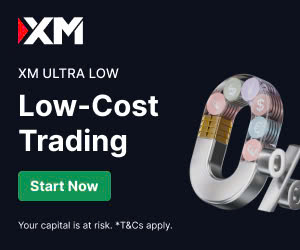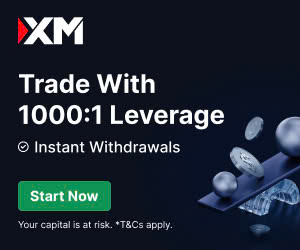
10 minute read
XM vs Etoro: A Comprehensive Comparison
The world of online trading has exploded in popularity, with platforms like XM vs eToro leading the charge. Whether you're a beginner dipping your toes into forex or a seasoned trader diversifying your portfolio, choosing the right broker is critical. Both XM vs eToro have built stellar reputations, but they cater to different trading styles and preferences. In this in-depth comparison, we’ll explore their features, fees, platforms, and more to help you decide which broker is best for you in 2025.

💥 Trade with XM now: Open An Account or Visit Brokers 🏆
Introduction: Why Compare XM vs eToro?
Online trading platforms have revolutionized how individuals access financial markets. From forex and CFDs to cryptocurrencies and stocks, brokers like XM vs eToro offer diverse opportunities for traders worldwide. However, each platform has unique strengths and weaknesses, making it essential to compare them based on your trading goals.
This article dives into a comprehensive comparison of XM vs eToro, covering key aspects such as regulation, trading platforms, fees, account types, and customer support. By the end, you’ll have a clear understanding of which broker aligns with your needs—whether you prioritize low spreads, social trading, or a robust educational ecosystem.
1. Overview of XM vs eToro
XM: A Forex and CFD Powerhouse
Founded in 2009, XM is a Cyprus-based broker renowned for its competitive spreads and fast execution. With over 3.5 million clients across 196 countries, XM specializes in forex, CFDs, commodities, and indices. It’s regulated by top-tier authorities like CySEC (Cyprus), ASIC (Australia), and IFSC (Belize), ensuring a secure trading environment. XM is particularly favored by traders seeking customizable accounts and access to MetaTrader 4 (MT4) and MetaTrader 5 (MT5) platforms.
eToro: The Social Trading Pioneer
Launched in 2007, eToro is an Israel-based broker famous for its social trading platform. With over 30 million users globally, eToro allows traders to copy the strategies of successful investors through its CopyTrader feature. Regulated by FCA (UK), CySEC, ASIC, and FINRA (USA), eToro offers a multi-asset platform, including forex, stocks, ETFs, cryptocurrencies, and CFDs. Its user-friendly interface makes it a go-to choice for beginners.
2. Regulation and Safety
Safety is a top priority when choosing a broker. Both XM vs eToro are well-regulated, but their regulatory frameworks differ slightly.
· XM: Licensed by CySEC, ASIC, IFSC, and DFSA (Dubai), XM adheres to strict financial standards. It offers negative balance protection and segregates client funds, ensuring your money is safe even if the broker faces insolvency. XM’s long-standing reputation and transparent operations make it a trusted choice.
· eToro: Regulated by FCA, CySEC, ASIC, and FINRA, eToro also provides negative balance protection and segregated accounts. Its listing on NASDAQ (under the ticker FTCV) adds an extra layer of credibility. However, eToro’s market maker model means it acts as the counterparty to your trades, which some traders may view as a potential conflict of interest.
Verdict: Both brokers are highly secure, but XM’s broader regulatory coverage across multiple jurisdictions gives it a slight edge for traders prioritizing safety.
3. Trading Platforms
The trading platform is the backbone of your trading experience. XM vs eToro offer distinct platforms tailored to different needs.
XM: MetaTrader Mastery
XM supports MetaTrader 4 (MT4) and MetaTrader 5 (MT5), industry-standard platforms known for their advanced charting, technical indicators, and automation capabilities. Key features include:
· Customizable interface: Tailor charts and layouts to your preferences.
· Expert Advisors (EAs): Automate trading strategies with algorithmic tools.
· Mobile and desktop access: Trade seamlessly across devices.
· Fast execution: XM boasts ultra-low latency, ideal for scalpers and day traders.
MT4 is perfect for forex-focused traders, while MT5 supports multi-asset trading, including stocks and futures. XM also offers a web-based platform for quick access.
eToro: Social Trading Simplicity
eToro’s proprietary platform is designed for ease of use and social engagement. Highlights include:
· CopyTrader: Automatically replicate the trades of top-performing traders.
· Social feed: Interact with a community of millions to share insights and strategies.
· Intuitive interface: Clean design with easy navigation, ideal for beginners.
· Multi-asset support: Trade forex, stocks, crypto, and more from one platform.
While eToro’s platform lacks the advanced tools of MT4/MT5, its simplicity and social features make it a standout for novice traders and those interested in copy trading.
Verdict: Choose XM if you prefer advanced tools and automation via MetaTrader. Opt for eToro if you value social trading and a beginner-friendly interface.
4. Account Types and Minimum Deposits
Account flexibility and entry barriers are crucial factors for traders.
XM: Diverse and Accessible
XM offers four main account types to suit various trading styles:
· Micro Account: Ideal for beginners, with a $5 minimum deposit and micro-lot trading.
· Standard Account: Similar to the Micro Account but with standard lot sizes, also requiring $5.
· XM Ultra-Low Account: Offers spreads as low as 0.6 pips, with a $50 minimum deposit.
· Shares Account: For stock trading, requiring a $10,000 minimum deposit.
XM’s low minimum deposits make it accessible to traders of all levels. It also provides Islamic accounts for Sharia-compliant trading.
eToro: One-Size-Fits-All
eToro offers a single account type for all traders, with a minimum deposit of $50 (varies by region). Key features include:
· Access to all assets, including real stocks, ETFs, and cryptocurrencies.
· eToro Club: A tiered loyalty program offering perks like lower fees and premium support, based on account equity (starting at $5,000).
· Professional accounts: Available for experienced traders who pass a qualification test, offering higher leverage.
eToro’s single account simplifies the onboarding process but lacks the customization of XM’s offerings.
Verdict: XM wins for its diverse account types and lower entry barrier ($5 vs. $50). However, eToro’s streamlined approach may appeal to those who prefer simplicity.
5. Fees and Spreads
Trading costs can significantly impact your profitability. Let’s compare the fee structures of XM vs eToro.
XM: Competitive and Transparent
XM’s fee structure is trader-friendly, with costs primarily based on spreads:
· Spreads: Variable spreads start at 0.6 pips on the XM Ultra-Low Account and 1.6 pips on Standard/Micro Accounts. The industry average for EUR/USD is 1.2 pips, making XM competitive.
· Commissions: No commissions on Micro, Standard, and Ultra-Low Accounts. The XM Zero Account charges a $3.5 commission per lot but offers spreads from 0 pips.
· Non-trading fees: A $15 inactivity fee applies after 12 months of no activity. Deposits and withdrawals are free for most methods.
XM’s low spreads and commission-free accounts make it a cost-effective choice for forex and CFD traders.
eToro: Higher Spreads, No Commissions
eToro operates a commission-free model, with costs embedded in spreads:
· Spreads: Fixed spreads start at 1 pip for EUR/USD, higher than XM’s variable spreads. Spreads for other assets, like stocks and crypto, are also above industry averages.
· Non-trading fees: A $10 monthly inactivity fee after 12 months and a $5 withdrawal fee. Deposits are free.
· Crypto fees: A flat 1% fee applies to cryptocurrency trades, on top of spreads.
eToro’s higher spreads make it less cost-effective for frequent traders, but its commission-free model is attractive for long-term investors.
Verdict: XM offers lower spreads and more cost-effective trading, especially for forex and CFDs. eToro’s higher spreads are a drawback, but its commission-free structure suits buy-and-hold investors.

💥 Note: To enjoy the benefits of the partner code, such as trading fee rebates, you need to register with XM through this link: Open An Account or Visit Brokers 🏆
6. Tradable Assets
The range of assets available can influence your ability to diversify.
XM: Forex and CFD Focus
XM offers over 1,000 instruments, including:
· Forex: 55 currency pairs, including majors, minors, and exotics.
· CFDs: Indices, commodities, stocks, precious metals, and energies.
· Cryptocurrencies: Limited to CFDs on major coins like Bitcoin and Ethereum.
XM’s asset selection is robust for forex and CFD traders but lacks real stocks and ETFs.
eToro: Multi-Asset Leader
eToro boasts over 5,000 instruments, including:
· Forex: 49 currency pairs.
· Real assets: Stocks, ETFs, and cryptocurrencies (e.g., Bitcoin, Ethereum).
· CFDs: Indices, commodities, and stocks.
· Unique offerings: Smart Portfolios and options trading via the eToro Options app.
eToro’s broader asset range, including real stocks and crypto, makes it ideal for diversified portfolios.
Verdict: eToro excels for traders seeking a wide variety of assets, especially real stocks and crypto. XM is better for forex and CFD-focused traders.
7. Education and Research
Educational resources are vital, especially for beginners.
XM: Robust Learning Hub
XM offers an extensive educational ecosystem:
· Webinars: Over 40 weekly sessions in multiple languages, covering beginner to advanced topics.
· Video tutorials: In-depth guides on trading strategies and platform use.
· Research tools: Daily market analysis, economic calendars, and forex signals.
· Demo account: Practice trading with virtual funds (expires after 90 days).
XM’s focus on education makes it a top choice for traders looking to build skills.
eToro: Community-Driven Learning
eToro’s educational offerings are less structured but leverage its community:
· eToro Trading School: Basic courses for beginners.
· Social feed: Learn from experienced traders through discussions and insights.
· Demo account: Unlimited practice with virtual funds.
· CopyTrader insights: Analyze the performance of top traders to inform your strategy.
eToro’s community-driven approach suits traders who learn best through interaction.
Verdict: XM provides superior educational resources, while eToro’s social learning is ideal for beginners who thrive in a community setting.
8. Customer Support
Reliable support is essential for resolving issues quickly.
· XM: Offers 24/5 support via live chat, email, and phone in multiple languages. Response times are fast, and phone support is a key differentiator.
· eToro: Provides 24/5 support via live chat and email but lacks phone support. Response times are generally prompt, though some users report delays during peak hours.
Verdict: XM edges out eToro due to its phone support and faster response times.
9. Pros and Cons
XM
Pros:
· Low minimum deposit ($5).
· Competitive spreads and commission-free accounts.
· Advanced MetaTrader platforms.
· Extensive educational resources.
· Strong regulatory framework.
Cons:
· Limited to forex and CFDs (no real stocks or ETFs).
· Demo account expires after 90 days.
eToro
Pros:
· Social trading and CopyTrader features.
· Wide range of assets, including real stocks and crypto.
· User-friendly platform for beginners.
· Commission-free trading for stocks.
· Unlimited demo account.
Cons:
· Higher spreads compared to industry averages.
· Limited advanced tools for experienced traders.
· Withdrawal fees and inactivity charges.
10. Which Broker Should You Choose?
The choice between XM vs eToro depends on your trading style and goals:
· Choose XM if you’re a forex or CFD trader seeking low spreads, advanced tools, and robust educational resources. Its MetaTrader platforms and flexible account types make it ideal for both beginners and experienced traders.
· Choose eToro if you’re a beginner or prefer social trading, copy trading, or a diverse asset portfolio. Its user-friendly platform and community-driven approach are perfect for those who value simplicity and interaction.
Both brokers are safe, regulated, and reputable, so you can’t go wrong. However, XM is better for cost-conscious traders, while eToro shines for those prioritizing social features and multi-asset trading.
Conclusion
In the XM vs eToro showdown, both platforms offer compelling features for different types of traders. XM stands out for its low-cost trading, advanced platforms, and educational resources, making it a top pick for forex and CFD enthusiasts. eToro, with its innovative social trading and diverse asset range, is a favorite among beginners and investors interested in stocks and cryptocurrencies.
Before deciding, consider your trading priorities—cost, platform features, or asset variety. Both brokers offer demo accounts, so you can test their platforms risk-free. Whichever you choose, ensure it aligns with your financial goals and risk tolerance.
💥 Note: To enjoy the benefits of the partner code, such as trading fee rebates, you need to register with XM through this link: Open An Account or Visit Brokers 🏆
Read more:

